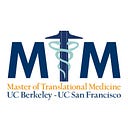[Capstone Project Spotlight] NextSense: Digital Interventions for ADHD
NextSense Inc, a leader in the field of innovative biosensing technology, is using the power of neuroscience and sound to tackle a pervasive health crisis: poor sleep. Via earbuds that adapt audio to a user’s brainwaves, NextSense aims to enhance individuals’ sleep quality and “restore energy, joy, and purpose in [their] daily life”.
The Master of Translational Medicine Program at UC Berkeley and UCSF partnered with NextSense for this year’s Capstone project. This month, we sat down with JB Berent and Caitlin Shure from NextSense to learn more about their inspiring work in the field.
The Core Issue: Poor Sleep Quality of Individuals with ADHD
Many individuals with ADHD experience sleep disturbances, including increased sleep onset latency and worse overall sleep quality. In addition, quality sleep is critical for individuals with ADHD because it plays a role in emotional regulation, attention, and cognitive function — all areas where this population may struggle. Without restorative sleep, ADHD symptoms can become more pronounced, making it harder to manage day-to-day tasks and leading to a decreased quality of life. For this population, who may already be medicated, adding a pharmacologic solution to sleep problems is unideal, necessitating effective non pharmacological solutions.
The Innovative Solution NextSense Proposes
NextSense’s comfortable, brain-responsive earbuds aim to improve sleep (latency, depth, quality) via sound interventions that make it easier to fall asleep and sleep more deeply. Simultaneously, the device can track sleep data via EEG. The project NextSense has in collaboration with MTM explores the effectiveness of this technique in adults with ADHD. Specifically, they will assess the effectiveness of various sounds at improving sleep, as well as the associated effect on daytime symptoms.
Why Their Solution is a One-of-a-kind
The treatment NextSense offers is nonpharmacologic — something that cannot be said for many approaches to sleep and attention. Moreover, unlike most interventions, NextSense’s earbuds come with a built-in measurement mechanism (EEG) to assess effectiveness.
Working with MTM Students
The MTM students are integral to designing the study at hand, performing both an initial literature review as well as study design. They are also contributing to EEG analysis algorithms that will help NextSense process the raw data collected by the earbuds.
This project is a part of NextSense’s larger initiative to create brain-responsive technology that not only improves sleep but also enhances daily energy, focus, and well-being. By partnering with MTM students, they are pushing the boundaries of what’s possible with non-invasive brain-sensing tech. Located in Mountain View, CA, NextSense is working tirelessly to develop groundbreaking technology that improves health and wellbeing.
